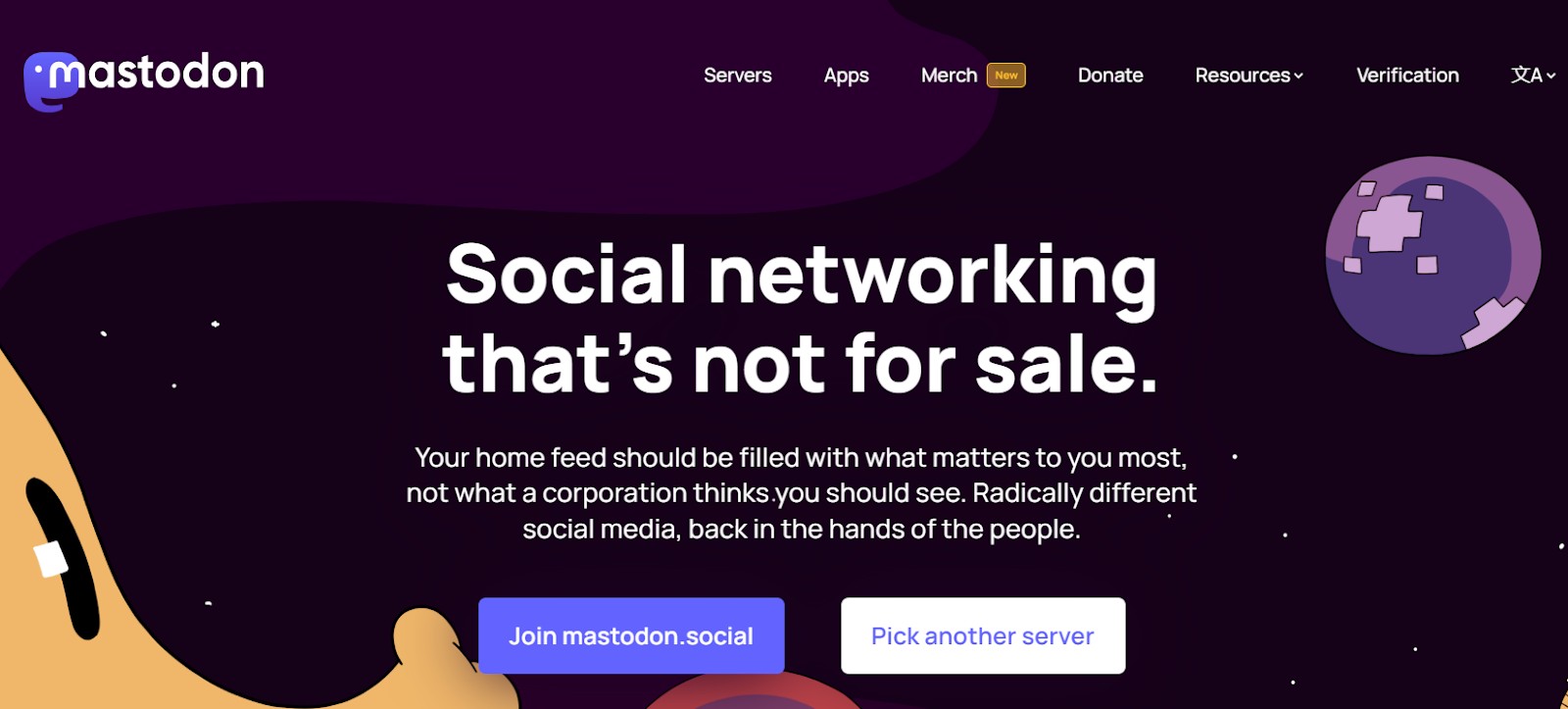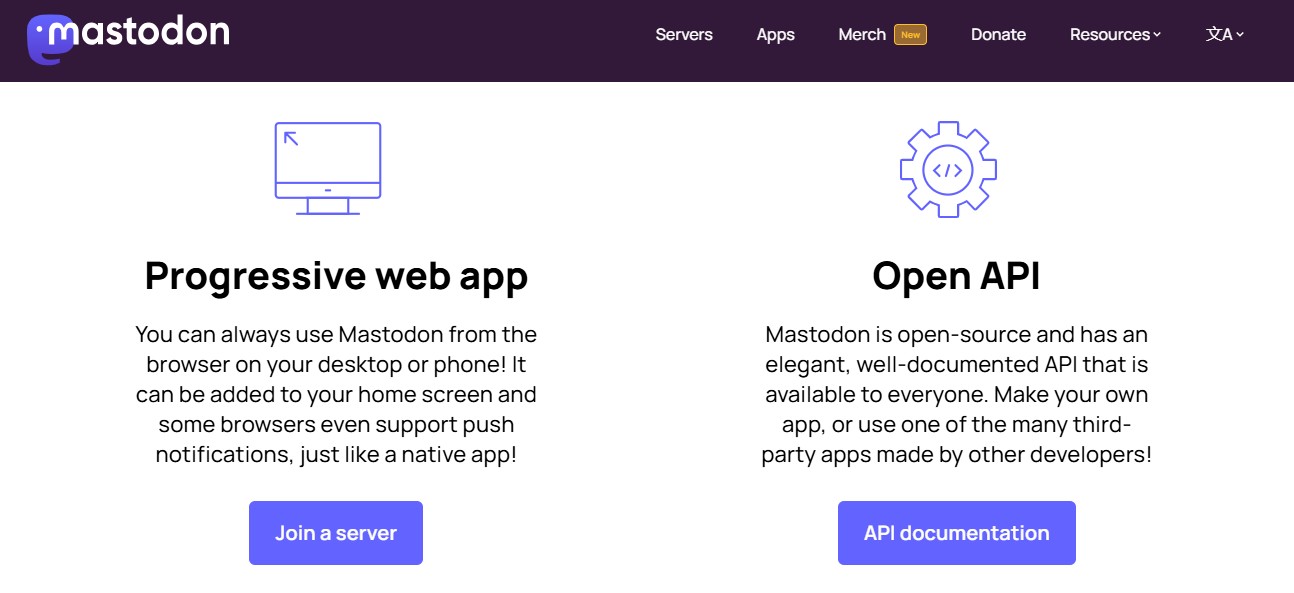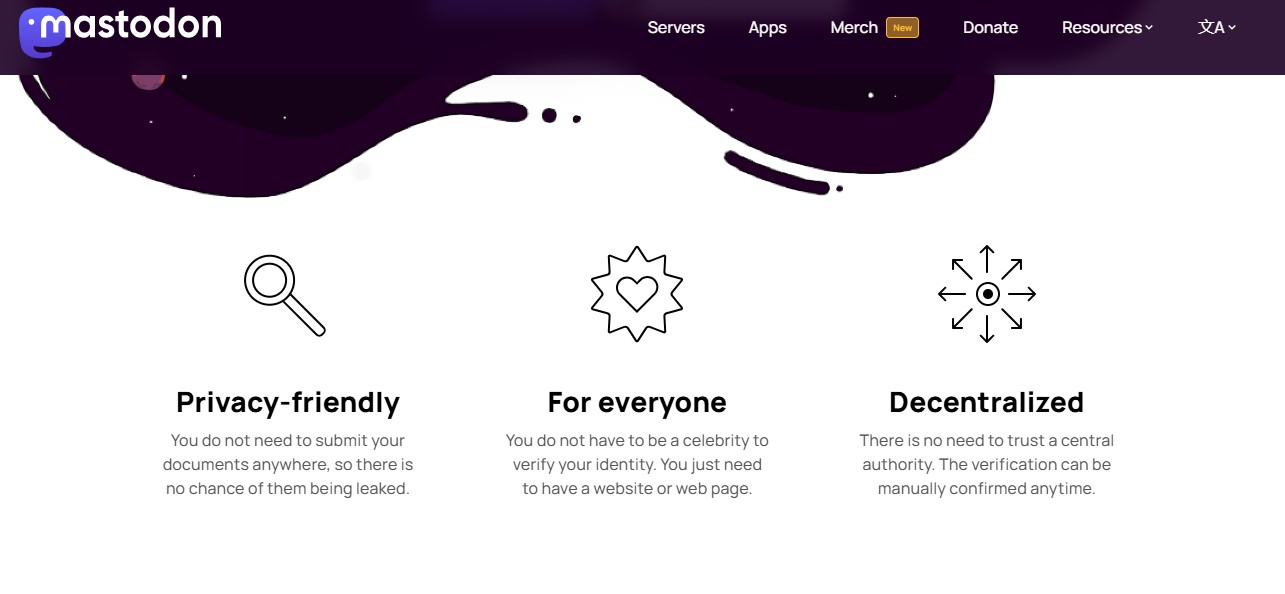Mastodon Social Media: A Comprehensive Guide



Editorial Note: While we adhere to strict Editorial Integrity, this post may contain references to products from our partners. Here's an explanation for How We Make Money. None of the data and information on this webpage constitutes investment advice according to our Disclaimer.
Mastodon is a social platform that’s different from the usual:
No central control. It’s decentralized.
Privacy-focused. You control your data.
Choose your server. Different communities, different topics.
Built by the community. Open-source, constantly improving.
No ads. Just a clean experience.
You manage moderation. You decide what’s appropriate.
Mastodon stands out for its strong focus on privacy, user control, and transparency. Unlike platforms like Twitter and Facebook that depend on ads and algorithms, Mastodon gives users more freedom by being decentralized. This guide will walk you through how Mastodon works, its features, alternatives, and why many people see it as one of the top alternatives to Facebook.
What is Mastodon social media?
Mastodon is a decentralized, open-source social media platform that forms part of the "Fediverse", a network of interconnected platforms. Unlike traditional platforms, Mastodon operates on independently hosted servers known as "instances". Each instance has its own rules, moderation policies, and communities but connects seamlessly with others in the Fediverse.
Key features of Mastodon:
Mastodon stands out with a variety of features that make it more user-friendly and community-driven than most social networks. Here’s a closer look:
Independent servers. Mastodon works through different servers run by various groups, letting you choose a community that aligns with your values.
Part of the Fediverse. It connects to other decentralized platforms, so you can interact with a broader network of people.
Personalized timeline. You can filter your feed to match your preferences, ensuring you only see what matters to you.
No centralized control. Each server runs independently, meaning there’s no corporate agenda dictating what you see.
Community-driven moderation. Servers set their own rules, giving members the power to manage what’s allowed in their space.
Ad-free. No annoying ads or data tracking, just pure content.

How does Mastodon work?
Mastodon works in a unique way compared to traditional social media, and knowing its structure can help you navigate it better. Here’s how:
Federated system. Mastodon connects to other networks, so no single company owns the platform.
Each instance has its own rules. Communities on Mastodon are shaped by their own rules and admins, giving each space a personalized vibe.
No algorithm pushing content. Mastodon doesn’t recommend content like Facebook or Twitter, so you see what you follow, giving you more control.
Moderation by the community. Instead of automated bots, users and admins work together to keep the platform clean and safe.
Transparency and openness. Mastodon’s code is open for anyone to look at or improve, making it transparent and customizable.
Everyone helps with moderation. Users can report inappropriate content, making it a joint effort to keep the community in check.

Step-by-step guide to using Mastodon
Join an Instance. Visit joinmastodon.org and select an instance.
Set up your profile. Add a bio, profile picture, and other personal details.
Engage. Follow accounts, boost (retweet) posts, and start conversations.
Discover communities. Use hashtags and explore timelines to find topics you love.
Mastodon’s privacy features
Mastodon offers strong privacy protections with features you won’t always find on other social platforms. Here’s a deeper look at some of the key features:
Decentralized control over your data. Each community (instance) on Mastodon sets its own privacy rules, giving you more control over your information.
No selling your data. Mastodon doesn’t sell or share your data with third parties, unlike many mainstream platforms.
Flexible moderation tools. Communities can customize how they manage content and protect users from invasive ads or unwanted tracking.
Choose your privacy for each post. You decide whether your post is public, hidden from search engines, or just visible to followers.
Minimal data collection. Mastodon collects only the data it needs to function, so it avoids the kind of surveillance that many other platforms use.
Private conversations are encrypted. Direct messages between users are encrypted, ensuring no one else can read them.

How to withdraw earnings from Mastodon
While Mastodon itself is not designed as a monetized platform, users who build an audience and provide valuable content can still generate earnings indirectly. Here’s how you can withdraw and manage your earnings effectively:
Crowdfunding platforms. Many people use other services to receive financial support for their work. These platforms let you easily transfer your earnings straight to your bank account or a payment service like PayPal.
Cryptocurrency payments. Some Mastodon users prefer to accept cryptocurrency payments. If you’ve provided your wallet address for donations, you can withdraw funds by transferring them to an exchange and converting them into fiat currency. You would, however, need an account with a crypto exchange for this. If you don’t have it already, here are some of the best options out there:
| Demo account | Min. Deposit, $ | Coins Supported | Spot Taker fee, % | Spot Maker Fee, % | Government-regulated | Investor protection fund | Foundation year | Open an account | |
|---|---|---|---|---|---|---|---|---|---|
| Yes | 10 | 329 | 0,1 | 0,08 | Yes | Yes | 2017 | Open an account Your capital is at risk. |
|
| No | 10 | 278 | 0,4 | 0,25 | Yes | No | 2011 | Open an account Your capital is at risk. |
|
| No | 1 | 250 | 0,5 | 0,25 | Yes | Yes | 2016 | Open an account Your capital is at risk. |
|
| Yes | 1 | 72 | 0,2 | 0,1 | Yes | No | 2018 | Open an account Your capital is at risk. |
|
| No | No | 1817 | 0 | 0 | No | No | 2004 | Open an account Your capital is at risk. |
Affiliate marketing and sponsorships. If you’re using Mastodon to promote affiliate links or sponsored content, earnings are typically managed through the respective program’s withdrawal options, such as direct deposit or checks.
Direct payments. Some users accept direct payments via PayPal or other services linked in their profiles. Ensure secure transactions by using reputable payment platforms.
Mastodon’s revenue is directly tied to community support, making it a prime example of how alternative platforms can thrive without relying on the same profit-driven tactics that dominate mainstream platforms.
Remember, Mastodon’s lack of advertising means that earnings rely heavily on your ability to build trust and provide value to your audience. Transparency with your supporters about how their contributions are used can further enhance your credibility.
Mastodon review: pros and cons
- Pros
- Cons
No central authority. With Mastodon, there’s no single entity calling the shots, allowing users to control the rules and moderation on their own.
Open-source and customizable. Mastodon’s open-source nature means you can change and tweak it however you want, offering flexibility and freedom.
Privacy-first design. Unlike other platforms that track your data, Mastodon puts your privacy first, offering a more secure space without relying on ads.
Learning curve. Mastodon’s decentralized setup can be tricky at first. Each server has its own guidelines, which can be overwhelming for new users.
Smaller audience. Since Mastodon isn’t as popular as other social platforms, it may be hard to find a large or active audience, especially if you’re used to mainstream platforms.
No integrations with big platforms. You won’t be able to link your Mastodon account to major apps like Instagram or Twitter, limiting the ability to share content across platforms.
Facebook alternatives: why choose Mastodon?
Mastodon stands apart from traditional social media platforms, offering features that cater specifically to users seeking privacy, community control, and a unique social experience. Here’s why beginners should consider Mastodon:
No central authority. Mastodon operates on a decentralized network, meaning no single company controls your data.
User-driven content moderation. Each Mastodon server has its own community rules and moderation, giving users control over their experience.
Transparent funding. Unlike Facebook, Mastodon’s finances are open and publicly available, ensuring transparency.
No ads or tracking. Mastodon is ad-free, focusing on user experience without the constant push for ad-driven content.
Better privacy. Mastodon doesn’t track your activity, making it an attractive option for privacy-conscious users.
Customizable experience. Users can personalize their Mastodon instance, from the server rules to the interface and features.
X alternatives: how does Mastodon compare?
Mastodon isn’t just an alternative to X (formerly Twitter) — it’s a fresh approach to online interaction. Here’s how it stands out:
Multiple servers, more freedom. Mastodon runs on different servers, each with its own community, giving you more options and less risk of censorship.
Ad-free, algorithm-free. No annoying ads or algorithms tracking your every move — Mastodon keeps things straightforward and user-focused.
Better privacy. You have more control over your data and who sees it. Mastodon doesn’t track you the way X does.
Moderation you control. Each server can set its own rules and moderation, so you have more say over the kind of content you interact with.
A cleaner experience. Mastodon doesn’t bombard you with endless posts or ads; just follow who you like and keep your feed focused.
More creative freedom. Mastodon lets you fully customize your profile and control what you share, making it your space.
Advanced features and strategies
Mastodon has some advanced features that can take your experience to the next level. Here are some tips to help you make the most of them:
Explore outside your circle. Check out content from different Mastodon communities using federated timelines to connect with people you wouldn't normally find in your follower list.
Customize your feed. Use Mastodon’s filter tools to block unwanted posts, whether they’re from specific users, certain hashtags, or keywords you’d rather not see.
Stay in control of privacy. Each post can have its own privacy setting, so you can choose who sees what — be it just your followers, a select few, or the whole world.
Get noticed with hashtags. Make sure to use trending and relevant hashtags — Mastodon’s federated system means your posts can be seen by a broader audience.
Build a niche community. If you’re into something specific, consider creating your own Mastodon instance. It’s a great way to bring together like-minded individuals.
Use other tools to help. Mastodon plays well with third-party apps, so use tools to automate things like posting and cross-platform sharing to save time.
Professional use of Mastodon:
Build your brand by engaging with niche communities.
Share insights to position yourself as a thought leader.
Network with professionals in your field.
Risks and warnings
Mastodon is a powerful platform, but beginners should be aware of potential risks and challenges. Here are some key points to consider:
Decentralization challenges. Lack of central moderation can lead to inconsistent policies across instances.
Instance-specific rules. Each Mastodon instance has its own rules, which can cause confusion and conflicts.
Data privacy concerns. Some instances may have weak data protection, putting your personal information at risk.
Community management. Small instances may struggle with moderation, leading to harmful content slipping through.
Server downtime. Mastodon relies on individual servers, and if one goes down, access to your instance may be interrupted.
Potential for fragmentation. Mastodon’s decentralized nature can result in a fragmented user experience, making it hard to follow conversations.
Understanding Mastodon’s decentralized structure and building meaningful engagement
Mastodon is different from the usual social media platforms, especially because it’s decentralized. This gives users more freedom but also means that each server has its own rules and style. While this makes it more diverse, it can also cause a bit of confusion. To make things easier, pick an instance that fits your interests right from the start. But the real beauty of Mastodon is that it gives you full control to build your own community, focusing on privacy and freedom from big corporations. It’s all about creating a network that’s tailored to your needs.
One of Mastodon’s hidden strengths is how it handles abuse and moderation. Unlike some big platforms, Mastodon puts the power in users’ hands to report and moderate harmful content. For anyone looking to grow their presence, keep in mind that Mastodon is less about viral content and more about forming real, lasting connections. Get involved in conversations, support others, and post things that matter. It’s all about consistent engagement and quality connections, which is a refreshing change from the quick attention-grabbing trends on other platforms.
Conclusion
Mastodon redefines social media by prioritizing user control, privacy, and meaningful engagement. Its decentralized structure ensures freedom from ads and algorithms, empowering users to shape their online experiences. While challenges like fragmentation and a smaller user base exist, Mastodon’s robust privacy features and open-source innovation make it a compelling alternative to platforms like Facebook and Twitter.
For those seeking ethical and community-focused interactions, Mastodon is a gateway to the future of decentralized social networking. Whether you’re a beginner exploring new platforms or an advanced user seeking more control, Mastodon offers endless possibilities for connection and collaboration in the industry.
FAQs
Can I switch instances after joining one?
Yes, Mastodon allows account migration. You can move your account to a new instance while retaining your followers and most data.
Are private messages secure on Mastodon?
Mastodon’s private messages are only accessible to intended recipients, but they are not encrypted end-to-end. Use caution with sensitive information.
Can I use Mastodon for sharing large files?
File size limits vary by instance. Many support media uploads like images and short videos, but for large files, consider linking to external services.
What happens if my instance shuts down?
You can migrate your account to a new instance and retain followers. However, local posts and specific settings may be lost.
Related Articles
Team that worked on the article
Parshwa is a content expert and finance professional possessing deep knowledge of stock and options trading, technical and fundamental analysis, and equity research. As a Chartered Accountant Finalist, Parshwa also has expertise in Forex, crypto trading, and personal taxation. His experience is showcased by a prolific body of over 100 articles on Forex, crypto, equity, and personal finance, alongside personalized advisory roles in tax consultation.
Chinmay Soni is a financial analyst with more than 5 years of experience in working with stocks, Forex, derivatives, and other assets. As a founder of a boutique research firm and an active researcher, he covers various industries and fields, providing insights backed by statistical data. He is also an educator in the field of finance and technology.
As an author for Traders Union, he contributes his deep analytical insights on various topics, taking into account various aspects.
Mirjan Hipolito is a journalist and news editor at Traders Union. She is an expert crypto writer with five years of experience in the financial markets. Her specialties are daily market news, price predictions, and Initial Coin Offerings (ICO).
Forex leverage is a tool enabling traders to control larger positions with a relatively small amount of capital, amplifying potential profits and losses based on the chosen leverage ratio.
Cryptocurrency is a type of digital or virtual currency that relies on cryptography for security. Unlike traditional currencies issued by governments (fiat currencies), cryptocurrencies operate on decentralized networks, typically based on blockchain technology.
Fundamental analysis is a method or tool that investors use that seeks to determine the intrinsic value of a security by examining economic and financial factors. It considers macroeconomic factors such as the state of the economy and industry conditions.
An investor is an individual, who invests money in an asset with the expectation that its value would appreciate in the future. The asset can be anything, including a bond, debenture, mutual fund, equity, gold, silver, exchange-traded funds (ETFs), and real-estate property.
Crypto trading involves the buying and selling of cryptocurrencies, such as Bitcoin, Ethereum, or other digital assets, with the aim of making a profit from price fluctuations.






























































































































